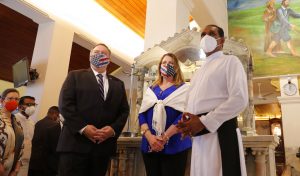By Abhijnan Rej

Less than a week before the November 3 presidential elections, U.S. Secretary of State Mike Pompeo’s whirlwind tour of South and Southeast Asia continues as he seeks buy in from regional powers for the Trump administration’s free and open Indo-Pacific strategy, framing the contest between China and democracies in Manichean terms.
After his two day visit to New Delhi on October 26 and 27, where he – along with Secretary of Defense Mark Esper – participated in a much-praised 2+2 defense and foreign ministers’ dialogue, Pompeo travelled to Sri Lanka on October 27, and from there on to the Maldives on October 28. The two visits to these Indian Ocean islands – entangled as they both are with China as well as India — could not be more different.
While in Colombo, Pompeo met with Sri Lanka’s President Gotabaya Rajapaksa as well as Foreign Minister Dinesh Gunawardena. A State Department readout of the Pompeo-Rajapaksa simply notes, in terms of what was on the agenda, that they “discussed post-pandemic economic recovery and development and noted the benefits of long-term U.S. private sector trade and investment, which offers sustainable, transparent, and high-quality partnership.” It goes on to add that the “two leaders agreed to remain in contact on issues of mutual concern, including cooperation on counterterrorism, and the post-pandemic economic recovery.” Aside from the bizarre phrase “two leaders” – which suggests parity between a secretary of state and a foreign head of state – what was striking is the near absence of security discussions, beyond counterterrorism.
In fact, the striking difference in tone between Pompeo and Gunawardena became visible in a joint press availability in Colombo. While Gunawardena did strike a warm note toward Pompeo and the United States – and more crucially, affirmed Sri Lanka’s commitment to “maintaining the freedom of navigation in our seas and airspace, also protecting sea lines of communication and the undersea cables,” given its location in the Indian Ocean – he was pointedly oblique when asked about the possibility of greater U.S. presence in Sri Lanka and of a triangular China-Sri Lanka-U.S. dynamics.
Responding to a question from a Voice of America reporter, Gunawardena noted “Sri Lanka is a neutral, non-aligned country committed to peace, as I mentioned earlier. On that principles, we hope to continue with our relations with the United States and other countries [emphasis mine].” Meanwhile, Pompeo’s remarks to the press were filled with what has become – sadly – a stereotype when it comes to the Trump administration, pitching China against the U.S. and referring to the geographic origin of the novel coronavirus.
As analysts had expected, there is little indication Pompeo’s visit led to progress being made around a new U.S.-Sri Lanka Status of Forces Agreement or the under discussion $480 million U.S. Millennium Challenge Corporation grant to Sri Lanka. (A Sri Lanka-U.S. Acquisition and Cross-Servicing Agreement was renewed in 2017.) Pompeo had cancelled his trip to Sri Lanka in June last year following anti-U.S. protests in that country.
The Maldives, however, was a different story, reflecting the Ibrahim Mohamed Solih government’s pivot away from China since coming to power in 2018. In September, the U.S. and the Maldives had agreed on a “Framework for U.S. Department of Defense-Maldives Ministry of Defense Defense and Security Relationship,” which would stand to deepen military cooperation between the two countries. Continuing the upward trajectory in relations, Pompeo announced in Male that the U.S. would be opening an embassy there, with a resident ambassador. (To date, the U.S. ambassador to Sri Lanka has had concurrent accreditation in the Maldives.)
In contrast to the summary of Pompeo’s meeting with Rajapaksa, the State Department readout of his meeting with Solih noted that “Secretary Pompeo and President Solih also discussed strengthening cooperation to advance our shared goals in the Indo-Pacific region [emphasis mine].”
Pompeo left Maldives for Indonesia earlier today where he will meet with Indonesian President Joko Widodo and Foreign Minister Retno Marsudi. Reuters reports Pompeo will also visit Vietnam on October 28-29, a last-minute addition to his calendar.
No comments:
Post a Comment